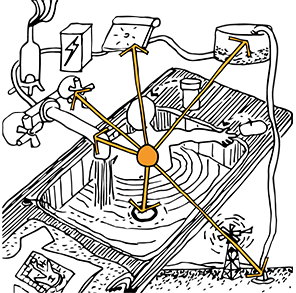More toilets for Nepal – ‘shovelling money abroad’
Lets start by considering the very positive side of all those who help.
Consider each village family (like the one in the photo) that makes a cash contribution equivalent to months of their income and also an in kind contribution to excavate the holes for septic tank or biogas system and carry materials down and up steep hills.
Then the local construction teams who, with training from previously experienced teams, work hard to complete the works, they are all paid a reasonable wage by Nepal standards but a fraction of an Australian wage (or any equivalent developed country).
The local Nepali NGO (CHDS our local project partner) co-ordinate all the works with the village committees, construction team and materials suppliers.
In Australia, Rotary is a partner in the project and a great supporter.
The majority of money to support the sanitation project and poor Nepali families comes from, student groups, business and professional groups , service clubs, international families and individuals.
And who hinders by grasping the wrong end of the shovel?
At a recent conference where HH presented a snapshot of the Sanitation Project a questioner commented on the ‘insignificant’ number of systems built (now totalling 117). We would agree that the number is small but that no family, or individual, is insignificant. Take a long look at thefamily above before discounting their importance.
An great way to stop progress is to never pick up the shovel and to see the problem as so large that any action will be meaningless. HH takes the view that incremental works, of a high standard ensuring a long lifespan, built and managed by local people will slowly spread and improve the living conditions of many.
Then we have the comments of two senior members of Australia’s new government very keen to stop shovelling.
Now in charge of supposedly the richest country (per capita) on earth, the Australian government has now seen it essential to use our total resources improving our infrastructure and not on foreign aid as the quoted section below reveals:
Just two days before the federal election, the Coalition finally announced how it planned to balance its budgetary books. And the biggest figure on the back of treasurer-in-waiting Joe Hockey’s beer coaster was a $4.5 billion cut in the projected foreign aid budget over four years to help fund ”essential infrastructure” in Australia.
”We can’t continue to fund a massive increase in foreign aid at the expense of investment in the Australian economy,’‘ (Treasurer)
Hockey declared. (Prime Minister) Abbott added insult to that injury: ‘‘We will build the roads of the 21st century rather than shovel money abroad.”
It is not the money that is the problem, much of the big aid money has often built poor solutions for poor people, but the attitude that dismisses the very existence of the family in the photo. As a result of international friends and a lot of local shovelling (or the hard sweat variety) the family now have a safe working toilet and a greater chance of improved health.









